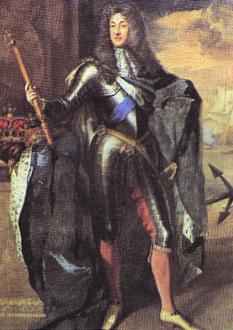
King James II
|
Chapter 6 From 1660 to the surrender of Galway to King William's forces, 1691
Return to table of contents Old map of Galway |
For the five succeeding years very little worthy of observation occurred in the town, with the exception of a loyal congratulatory address presented in 1683, by the corporation to Charles II on the escape of his majesty, and the duke of York, from the Rye-house conspiracy;[q] and a memorial in the year 1684, from the Catholic merchants and traders, (many of whom had, in the interim, been permitted to return,) to the lord lieutenant and council, for a reduction and settlement of the charter duties, whereupon a certain schedule was agreed to between them, and the corporation, under which these duties afterwards continued to be received. [r] On the accession of James II to the throne, the hopes of the proscribed Catholic natives of Galway once more revived, and they ventured more freely to approach the town.
 King James II |
The king soon after having directed the earl of Clarendon, the lord lieutenant, to provide for the admission of Catholics to the freedom of corporations, colonel Russell, the mayor, on the 25th of June, 1686, received directions from his lordship to admit to their freedom such of the Roman Catholic merchants and dealers as should desire it, without tendering the oath of supremacy, or any other oaths except those of allegience and of freemen, at the same time nominating nineteen of the principal persons to be immediately admitted free, and sworn of the common council. This communication was received with dismay. The council assembled; and, after some debate, the mayor was requested to communicate their readiness to admit these, and all other the natives and inhabitants of the town, to their freedom; but as, by the rules of the corporation, they were bound and sworn to maintain the ancient customs, one of which was, that the common council should be elected only on the Monday after Michaelmas day, they should be obliged to postpone that part of his directions until then; but that, on the 2d of July following, those to be admitted free would be proposed in tholsel. In answer to this, the lord lieutenant observed, that in extraordinary cases they were not bound to any particular day to admit members of the council, and peremptorily directed immediate obedience to his former orders.s Accordingly, in the beginning of July, one hundred and sixty Catholics, of the ancient names and natives, were sworn, and before the end of the year several others were admitted, by which time they obtained a complete ascendancy in the corporation. t
After the severe treatment which Roman Catholic inhabitants of the town had, for many years before this period, experienced, it would be expecting more than the nature of man is capable of, (at least in an aggregate body actuated by the mingled feelings of passion, prejudice and revenge,) if they did not, on the present occasion, not only feel elated, but even proceed to lengths which, under other circumstances would be unjustifiable. In the scenes which follow, however. they exercised their newly-acquired power with moderation, compared with the former proceedings of their opponents. Soon after their admission, they informed the lord lieutenant that the revenues of the town were embezzled and misapplied, and offered to prove the fact, if an investigation were ordered. This was promised; and the mayor, who was principally concerned in the charge, was directed not to offer himself as a candidate for that office the ensuing year, and he was soon after ordered to march with his regiment to Athlone.u On the Ist of August, 1686, John Kirwan Fitz-Stephen, (afterwards Sir John Kirwan, of Castlehacket,) a Catholic, was elected mayor for the ensuing, year; and the earl of Clanricarde, another, was appointed governor of the town.
Next: Protestant inhabitans removed